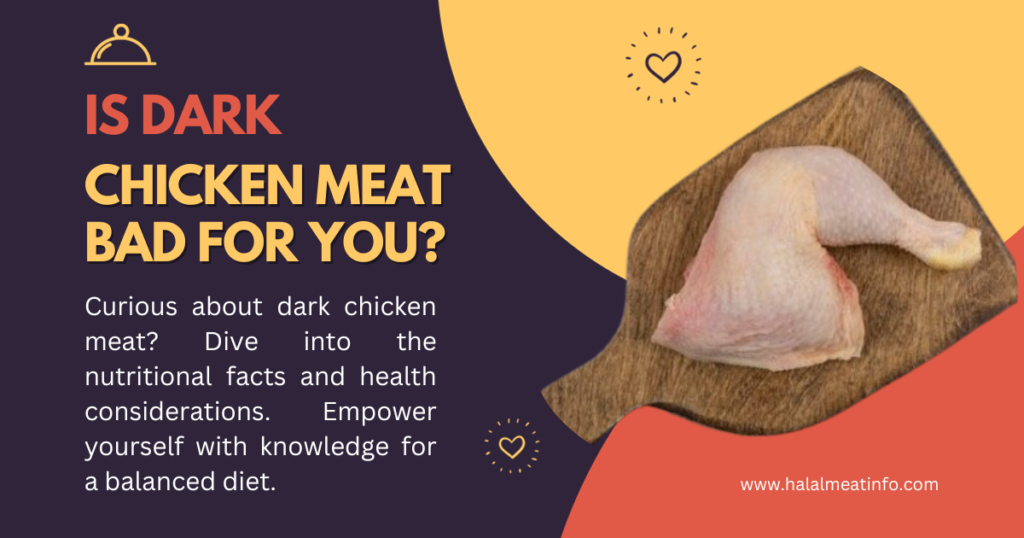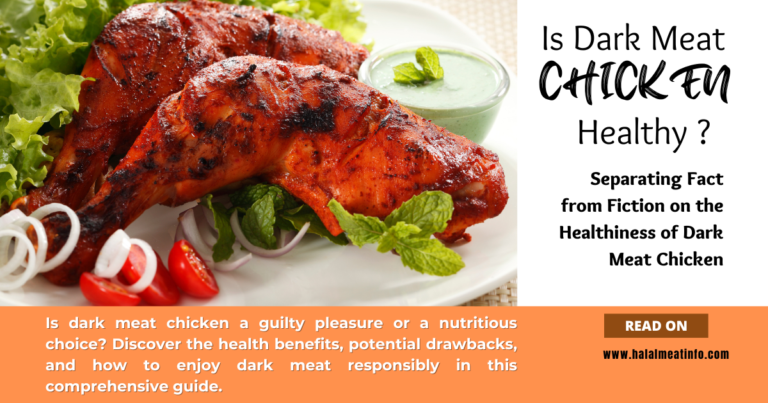Is Dark Chicken Meat Bad for You?
Ever found yourself pondering over the health implications of indulging in dark chicken meat? You’re not alone. In this blog post, we’ll dive into the world of poultry to unravel the mystery behind whether dark chicken meat deserves its sometimes controversial reputation. Let’s break down the nutritional content, debunk myths, and explore whether including dark chicken meat in your diet is a culinary choice that aligns with your health goals. Join us on this journey of discovery, where we’ll shed light on the question: Is dark chicken meat bad for you?

Understanding Dark Chicken Meat
Dark chicken meat refers to the meat from the legs, wings, and thighs of a chicken. It has a deeper hue than white meat, owing to its elevated myoglobin content. Myoglobin, a protein facilitating oxygen transport to muscle cells, imparts the dark color to chicken meat.
The darker shade signifies a greater presence of slow-twitch muscle fibers, crucial for endurance and richer in nutrients compared to the fast-twitch fibers prevalent in white meat. This makes dark chicken meat a good source of essential vitamins and minerals.
The Nutritional Profile of Dark Chicken Meat
Dark poultry meat is a nutritional powerhouse, offering essential nutrients beneficial for overall health. A 100-gram serving of roasted chicken thigh contains the following nutrients:
- Protein: 20.6 grams
- Fat: 11.2 grams
- Iron: 1.5 milligrams
- Zinc: 1.3 milligrams
- Vitamin B12: 0.4 micrograms
Quality of Nutrition
- Protein: Dark chicken meat is a protein powerhouse, delivering all nine essential amino acids crucial for our body.
- Fat: This type of chicken meat has higher fat content compared to white chicken meat, but the difference is not drastic. Surprisingly, It contains heart-healthy monounsaturated and polyunsaturated fats.
- Vitamins: It is a robust source of B vitamins, encompassing niacin, vitamin B6, and vitamin B12.
- Minerals: It also contains essential minerals like iron, zinc, and selenium.
Understanding the Difference Between White and Dark Meat
It’s important to understand the distinction between white and dark meat in chicken. White meat originates from the breast and wings, presenting a lighter color. It’s lean, protein-rich, and low in fat—preferred by health-conscious individuals. Conversely, dark meat from the legs and thighs is darker due to its elevated myoglobin, aiding oxygen transport to muscles.
The nutritional profiles of these two meats differ significantly. While both offer a good amount of protein, dark meat typically contains more vitamins and minerals. It’s rich in iron, zinc, and vitamin B12, vital for a healthy immune system and cognitive function. In contrast, white meat is a leaner option, lower in calories and fat, suitable for those mindful of their calorie consumption. Recognizing these distinctions helps in making informed choices about chicken in your diet.
Is Dark Chicken Meat Bad for You?
There is often a debate about whether dark chicken meat is bad for you or not. Dark meat typically contains more fat than white meat. This has led many people to believe that dark chicken meat should be avoided in a healthy diet.
However, it’s important to note that not all fats are bad for you. In fact, there are different types of fat and some are actually essential for our bodies to function properly. Dark chicken meat contains higher amounts of monounsaturated and polyunsaturated fats, which have been shown to have numerous health benefits. It can contribute to a sense of fullness, potentially assisting in controlling portion sizes. Additionally, dark chicken meat is abundant in iron, zinc, and B vitamins like niacin, thiamine, and riboflavin.
So, is dark chicken meat bad for you? The answer is no. As with any food, moderation is key. It is recommended to consume a variety of meats in your diet.
Is Dark Meat Chicken Good For You | Benefits of Dark Chicken Meat
Dark poultry meat, aside from being delicious, carries numerous health benefits. Its high protein content aids in muscle building and repair, while its rich iron content plays a crucial role in hemoglobin production and oxygen transportation throughout the body. Dark meat also provides ample zinc, which is known to bolster the immune system, and Vitamin B12, essential for maintaining nerve health and the production of DNA.
The Role of Dark Meat in a Balanced Diet
Integrating dark chicken meats into your diet contributes to overall dietary balance. Coupled with a variety of vegetables, grains, and fruits, dark meat can provide a rich and diverse mix of nutrients. Remember, the key is moderation. While it’s slightly higher in fat content, when consumed in appropriate quantities, dark meat forms a healthy, nutrient-rich component of diet, contributing to overall well-being.
Weight Management
Dark chicken, despite its slightly higher fat content, can play a substantial role in weight management. Its high protein content promotes satiety, which can aid in controlling calorie intake and thereby contribute to weight loss efforts. Remember, the key is in the serving size and preparation method: avoid frying and opt for grilling or baking instead.
Heart Health
While dark chicken does contain more fat than white meat, it’s important to note that these are mostly unsaturated fats, known for their heart-health promoting properties. B vitamins, particularly niacin and vitamin B6, found in dark meat, help reduce cholesterol levels and lower the risk of heart disease.
Brain Function
Dark chickens meat is a rich source of Vitamin B12 and iron, which are essential for cognitive health. Vitamin B12 supports nerve health, while iron is vital for red blood cell production, ensuring oxygen supply to the brain. Consuming dark meat contributes to optimal brain function, potentially reducing the risk of cognitive decline.
Is Dark Meat Unhealthy? -Health Controversies Surrounding Dark Chicken Meat
Popular Health Concerns
The primary concern revolves around the higher fat and calorie content in dark chicken meats. Concerns about weight gain or increased cholesterol levels due to dark meat consumption are unfounded. Another concern is the potential presence of hormones or antibiotics in chicken, which could have negative health effects.
Research Views and Studies on These Concerns
- Studies have shown that while dark chicken meat contains slightly more fat and calories than white meat, the difference is not significant enough to contribute to weight gain or high cholesterol when consumed in moderation.
- The presence of hormones or antibiotics in chicken meat is a widespread concern. But it is essential to note that this is not limited to dark meat alone. Both white and dark meat may contain these substances if the chickens are not raised organically.
- Most health organizations, including the USDA, assert that the benefits of consuming dark poultry meat, such as its high nutrient content, outweigh any potential risks associated with its slightly higher fat content.
- Research has also indicated that cooking methods significantly impact the healthiness of chicken meat. Grilled or baked chicken is healthier than fried or breaded chicken, irrespective of whether it’s white or dark.
- Lastly, it is always recommended to have a balanced diet, incorporating a variety of food groups to ensure all nutritional needs are met. Chicken, encompassing both white and dark, can be part of a balanced diet.
Incorporating Dark Chicken Meat in a Balanced Diet
Incorporating dark chicken meats into a balanced diet is simple and versatile. Versatile in use, dark poultry meat fits well into various dishes like stir-fries, soups, salads, and casseroles. To ensure you get its full benefits without unnecessary fats, consider grilling, baking, or steaming instead of frying. Pair dark chicken meats with fiber-rich whole grains like brown rice or quinoa, and a variety of colorful vegetables to create a nutrient-dense meal that offers proteins, complex carbohydrates, and healthy fats. Portion control is key, a serving size of about the size of your palm is usually adequate. Additionally, try to source organic or free-range chicken when possible to avoid potentially harmful antibiotics or hormones. With these steps, dark chicken meats can be a beneficial component of a balanced and healthy diet.
Misconceptions About Dark Chicken Meat
A common misconception about dark poultry meat is that it’s unhealthy due to its higher fat content compared to white meat. However, it’s crucial to understand that the fats in dark meat are mostly unsaturated, which are good for heart health. Plus, the difference in calorie content between dark and white meat is relatively minor. Another misconception is that dark meat is loaded with hormones or antibiotics, but it’s important to note that these substances can be present in both white and dark meat, depending on how the chickens are raised. Therefore, it’s always recommended to opt for organic or free-range chickens to ensure the healthiest choice. Understanding these misconceptions can help in making well-informed dietary decisions.
FAQ’s
No, the fat in dark chicken is mostly unsaturated and good for heart health. The calorie difference between white and dark meat is minor.
Both white and dark meat can contain these substances, depending on how the chickens are raised. Opt for organic or free-range chickens to avoid this.
Yes, it’s high in protein which promotes satiety, helping control calorie intake.
Dark meat contains B vitamins that can actually help reduce cholesterol levels.
You can use it in dishes like stir-fries, soups, salads, and casseroles. Pair it with whole grains and a variety of vegetables for a nutrient-dense meal. Remember, portion control is key.
Conclusion
In conclusion, Dark chicken meat, despite common misconceptions, is a nutrient-rich food that can contribute positively to a balanced diet. It is packed with essential vitamins and minerals that promote heart and brain health. While it does contain slightly more fat and calories than white meat, these are primarily unsaturated fats known for their health benefits. Furthermore, the difference in calorie content is relatively minor and unlikely to contribute to weight gain when consumed in moderation. It’s important to remember that the key to a healthy diet is variety and balance, and dark poultry meat can certainly be a part of this. Choosing organic or free-range chicken can help avoid potential hormones or antibiotics. Lastly, the method of preparation and portion control also play a significant role in ensuring that you reap the full benefits of this nutritious food.






